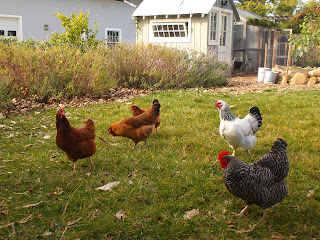
from August-October my black giant jersey hen, Opal's, bottom got more and more swollen. her vent was so stretched to the side that she could barely poop. and as you see in the pictures it stuck out very far. When this happens to a hen she is either egg bound or has some kind of infection. and in both circumstances, there isnt much you can do. if she is egg bound, soak her bottom in warm water so the egg can move through the cloaca. but more commonly it doesnt get better, which results in death within weeks-months, which is the most humane thing for the bird, since she is greatly in pain. so, Opal died in late October. and to make sure, that she was egg bound (which is good compared to the other options, so the other chickens wont get infected) i turned her on her back, and using doctor gloves and a serrated knife (easier to cut), to find out what was inside. sure enough
 , out came stinky yellow/orange goo, and many (i stopped counting at 30) soft shell eggs with rotting yolks inside, and a large hard shelled something decomposing in her uterus. her uterus was also the size of two fists, compared to the normal size of an egg. there was also eggs jammed between her intestines and other organs. there isnt much you can do to prevent this except keep their stress level down.
, out came stinky yellow/orange goo, and many (i stopped counting at 30) soft shell eggs with rotting yolks inside, and a large hard shelled something decomposing in her uterus. her uterus was also the size of two fists, compared to the normal size of an egg. there was also eggs jammed between her intestines and other organs. there isnt much you can do to prevent this except keep their stress level down. so opal is in chicken heaven right now, along with my others: Dolly, Gerty, and Belle. that is the one thing we-pet owners- must remember: that heartbreak always comes with getting an animal.
this is a picture of when i dissected Opal. she is upside down. all the orange stuff coming out if her is what i believe to be rotting eggs. and thats not even all of them! i just had to find out what was wrong with her...

 If you have chickens who tend to escape frequently from their designated area, then first check the run, or surrounding border, of their area to see if there are any places they can go through or get under. if there isnt, or they continue to escape, then most likely they are flying over the fence (chickens can "fly" up to probably 8 feet (if they really wanted to) depending on their size-the smaller the higher) the way to fix this problem is to clip their wings. this doesnt hurt then in any way, its just like cutting nails or hair. all youre cutting are feathers. there are 5 simple steps to do this:
If you have chickens who tend to escape frequently from their designated area, then first check the run, or surrounding border, of their area to see if there are any places they can go through or get under. if there isnt, or they continue to escape, then most likely they are flying over the fence (chickens can "fly" up to probably 8 feet (if they really wanted to) depending on their size-the smaller the higher) the way to fix this problem is to clip their wings. this doesnt hurt then in any way, its just like cutting nails or hair. all youre cutting are feathers. there are 5 simple steps to do this:

 thought she was going to die because she had something hanging out of her vent (butt hole) and was acting very weak and sickly for a week. so i called my chicken expert (hey, even shrinks have shrinks :) and said that if it was tissue coming out there was nothing to do to help her. or it could be an egg shell, which would come out eventually. i tried to check it out, thankfully with belle's cooperation, by cuts probably a pound of chunky poops that were stuck to her fuzzies. then i saw the tube like thing hanging out. i gave a little tug to see if she just needed help to get it out. i had to get another opinion, and dad was the only one brave enough to look. he thought it was tissue. so that got me very concerned. so here's what i did:
thought she was going to die because she had something hanging out of her vent (butt hole) and was acting very weak and sickly for a week. so i called my chicken expert (hey, even shrinks have shrinks :) and said that if it was tissue coming out there was nothing to do to help her. or it could be an egg shell, which would come out eventually. i tried to check it out, thankfully with belle's cooperation, by cuts probably a pound of chunky poops that were stuck to her fuzzies. then i saw the tube like thing hanging out. i gave a little tug to see if she just needed help to get it out. i had to get another opinion, and dad was the only one brave enough to look. he thought it was tissue. so that got me very concerned. so here's what i did:













